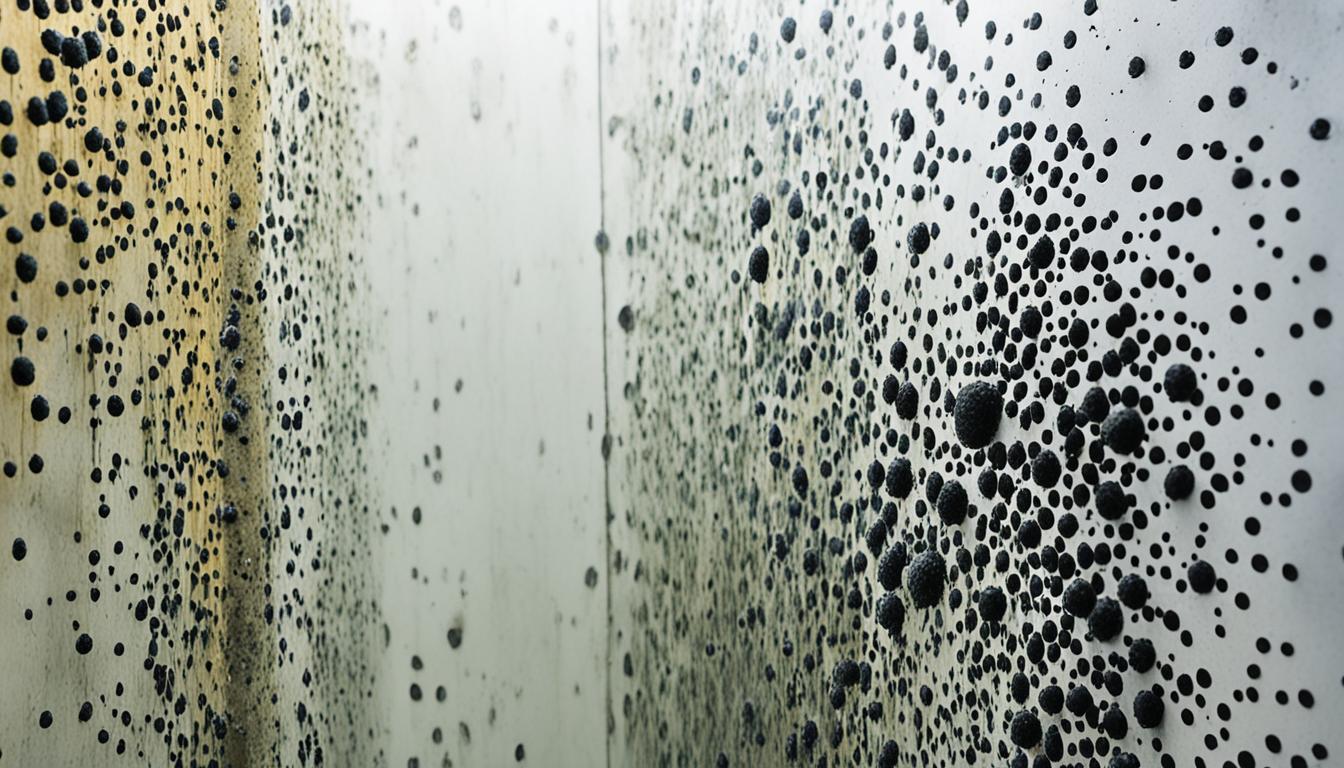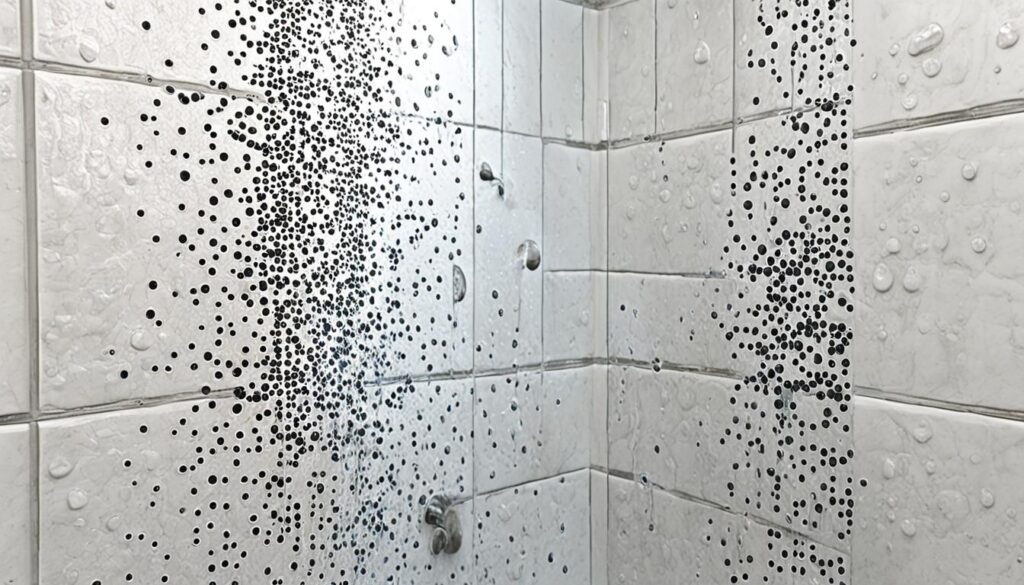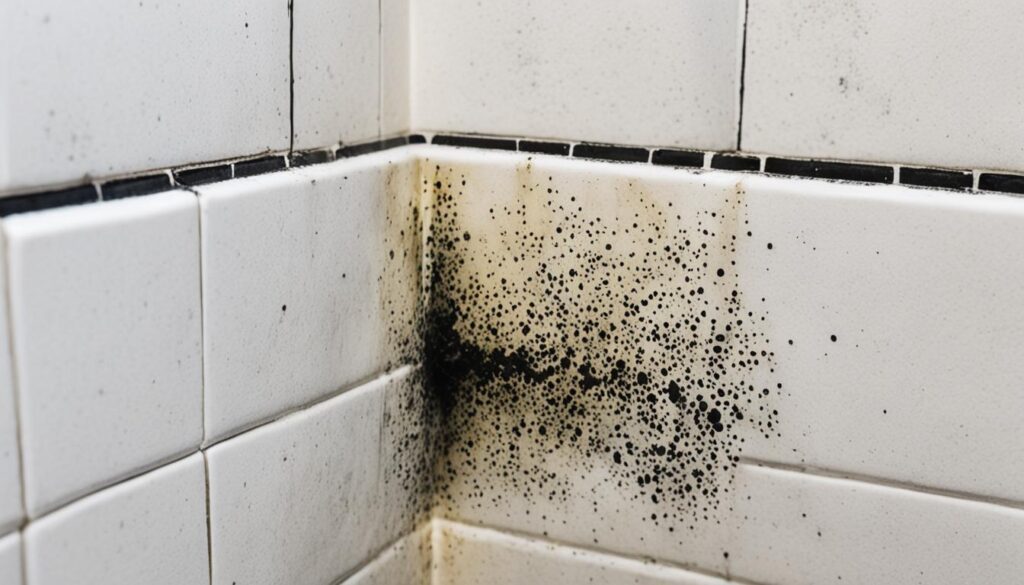
Understanding Dangerous Black Mold Risks & Removal
Black mold in showers can pose significant health hazards if left unaddressed. Not only can it cause respiratory issues and allergies, but it can also contribute to the deterioration of the shower’s structure and compromise the overall integrity of the bathroom. Effective removal strategies are crucial to ensure the well-being of both the occupants and the property itself.
In this article, we will explore the dangers of black mold in showers, including the health risks it presents. We will also provide practical and effective strategies for removing black mold and preventing its recurrence.
Key Takeaways:
- Black mold in showers can have negative health effects and compromise the structural integrity of the bathroom.
- Effective removal strategies are crucial to protect the well-being of both occupants and property.
- Excess moisture, poor ventilation, and water damage are common causes of black mold growth in showers.
- Proper safety precautions, such as wearing protective gear, should be followed during the removal process.
- Addressing the underlying causes of mold growth is essential to prevent its recurrence.
The Health Hazards of Black Mold in Showers
Black mold in showers not only affects the appearance of your bathroom but can also pose serious health risks. Exposure to black mold can lead to a range of health problems, particularly for individuals with weakened immune systems or pre-existing respiratory conditions.
Respiratory Issues: One of the primary health hazards associated with black mold in showers is the impact it can have on respiratory health. When mold spores are inhaled, they can irritate the respiratory tract and cause symptoms such as coughing, wheezing, and shortness of breath. Prolonged exposure can worsen these symptoms and lead to chronic respiratory conditions, such as asthma or bronchitis.
Allergies: Black mold can also trigger allergic reactions in susceptible individuals. Common symptoms of mold allergies include sneezing, itchy or watery eyes, a runny nose, and skin rashes. If you or your family members experience these symptoms, it is essential to investigate for black mold in your shower as a possible cause.
“Mold is a common allergen that can cause a variety of symptoms, from mild nasal congestion to more severe respiratory distress in individuals with allergies or asthma.” – Dr. Sarah Johnson, Allergist
Other Health Problems: In addition to respiratory issues and allergies, black mold exposure has also been linked to other health problems. These may include headaches, fatigue, dizziness, and even more severe conditions in rare cases.
Common Causes of Black Mold Growth in Showers
Understanding the causes of black mold growth is crucial in preventing its occurrence and addressing the problem effectively. Several factors contribute to the growth of black mold in showers:
- Excess Moisture: Showers create a moist environment that is ideal for mold growth. Insufficient ventilation or improper drying can cause moisture to build up, creating the perfect conditions for black mold to thrive.
- Poor Ventilation: Inadequate airflow in the bathroom can result in high humidity levels, promoting mold growth. It’s important to ensure proper ventilation through the use of exhaust fans or open windows to reduce moisture accumulation.
- Water Damage: Leaks in pipes, faucets, or the shower itself can lead to water damage, providing the moisture necessary for black mold to develop. Regular inspection and prompt repair of any leaks are essential in preventing mold growth.
Identifying and addressing these common causes of black mold growth can help prevent the recurrence of this health hazard in your shower.
| Common Causes of Black Mold Growth in Showers | ||
|---|---|---|
| Excess Moisture | Poor Ventilation | Water Damage |
| High humidity due to lack of ventilation or improper drying. | Inadequate airflow and trapped moisture in the bathroom. | Leaks in pipes, faucets, or the shower itself. |

Effective Removal Strategies for Black Mold in Showers
When it comes to dealing with black mold in showers, it’s crucial to have effective removal strategies in place. Prompt action and the right techniques can help ensure a thorough and successful mold removal process. This section will provide practical tips and step-by-step instructions to help you tackle black mold in your shower effectively.
Safety First: Protect Yourself During Removal
Before you start removing black mold from your shower, it’s essential to prioritize safety. Mold spores can be harmful when inhaled or come into contact with the skin, so taking proper precautions is crucial. Make sure to:
- Wear protective gear, including gloves and a mask, to minimize exposure to mold spores.
- Open windows or use fans to ensure proper ventilation while working in the shower.
- Keep children and pets away from the area to prevent accidental exposure.
Step-by-Step Guide to Removing Black Mold
To effectively remove black mold from your shower, follow these step-by-step instructions:
- Start by preparing a cleaning solution of equal parts water and white vinegar.
- Apply the solution to the affected areas using a spray bottle or sponge.
- Scrub the moldy surfaces vigorously to remove the mold growth.
- Rinse the area thoroughly with clean water to remove any residue.
- For stubborn mold stains, mix a paste of baking soda and water and apply it directly to the stains. Let it sit for a few minutes before scrubbing.
- Once the mold has been removed, dry the shower thoroughly to discourage future mold growth.
Remember, it’s essential to address the underlying causes of black mold growth to prevent recurrence. Ensure proper ventilation in your bathroom, fix any leaks or water damage, and regularly clean and maintain your shower area to reduce moisture and mold-friendly conditions.
Recommended Products for Black Mold Removal
While home remedies like vinegar and baking soda can be effective for small mold infestations, some cases may require stronger solutions. Here are a few recommended products for black mold removal:
| Product | Description |
|---|---|
| Mold Remover Spray | Specifically formulated to eliminate black mold, this spray offers convenience and effectiveness. |
| Bleach | A powerful disinfectant that can effectively kill mold spores, but be cautious when using, as it may damage certain surfaces. |
| Hydrogen Peroxide | A safer alternative to bleach, hydrogen peroxide can effectively kill mold without as much potential for surface damage. |
Choose the product that best suits your needs and always follow the manufacturer’s instructions for safe and effective use.
By following these effective removal strategies and taking the necessary precautions, you can successfully tackle black mold in your shower. Remember, addressing black mold promptly not only improves the cleanliness and appearance of your bathroom but also helps protect your health and well-being.

Conclusion
Black mold in showers is a serious issue that poses significant health hazards. As discussed in the previous sections, prolonged exposure to black mold can lead to respiratory problems, allergies, and other adverse health effects. It is crucial for homeowners to address this problem promptly to protect the well-being of their families and maintain a safe living environment.
Effective removal strategies are essential to eliminate black mold in showers. Following proper safety precautions, such as wearing gloves and masks, is crucial to reduce personal exposure to mold spores during the removal process. It is also important to address the underlying causes of mold growth, such as excess moisture and poor ventilation, to prevent recurrence.
If you are facing black mold issues in your shower and require professional assistance, Fix Mold Miami is here to help. They offer reliable mold assessments, prevention strategies, and remediation services. With their expertise, you can ensure thorough mold removal and take proactive steps to prevent its return. Contact Fix Mold Miami at [phone number] or visit their website [website URL] for more information.




